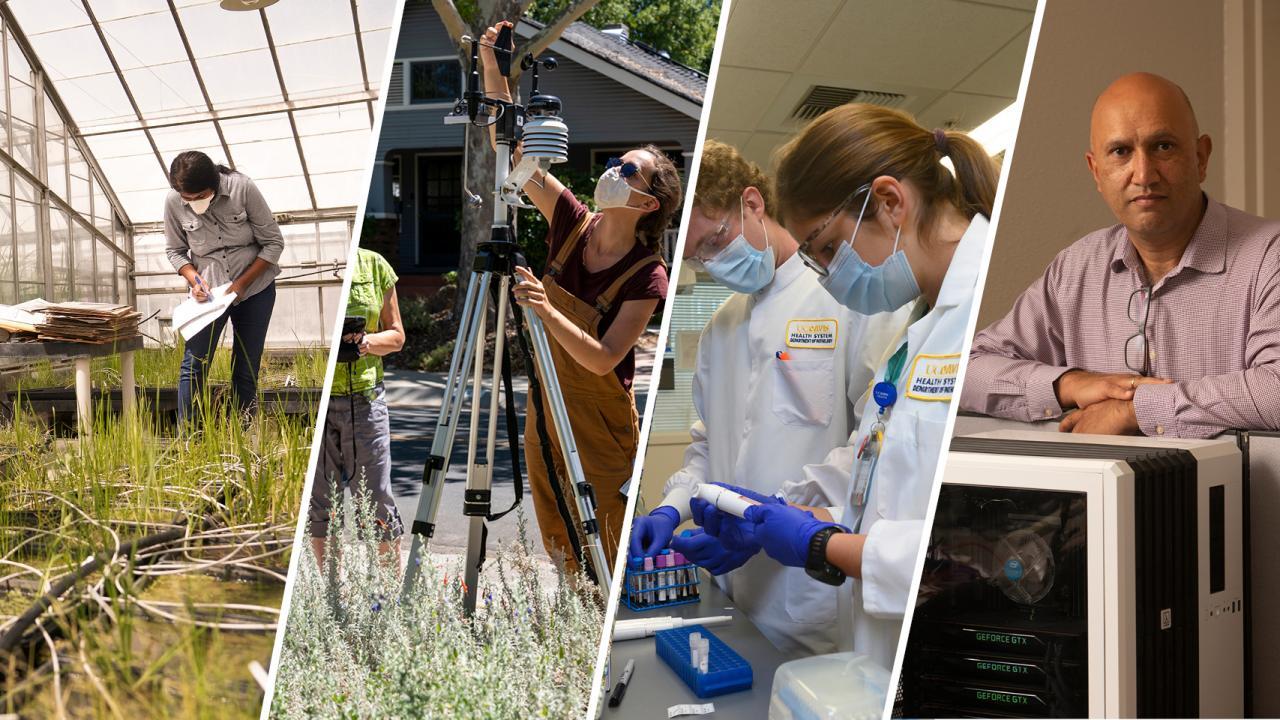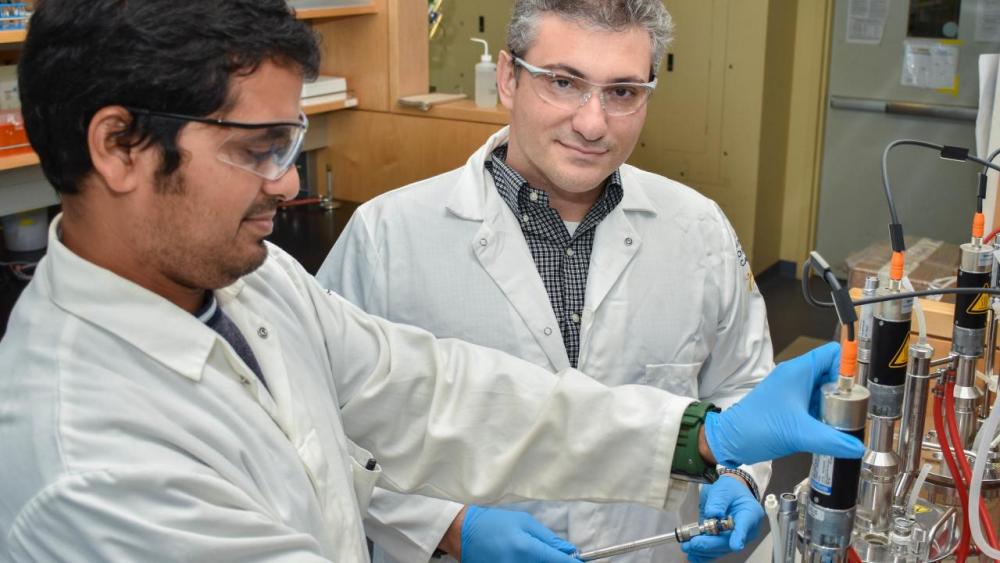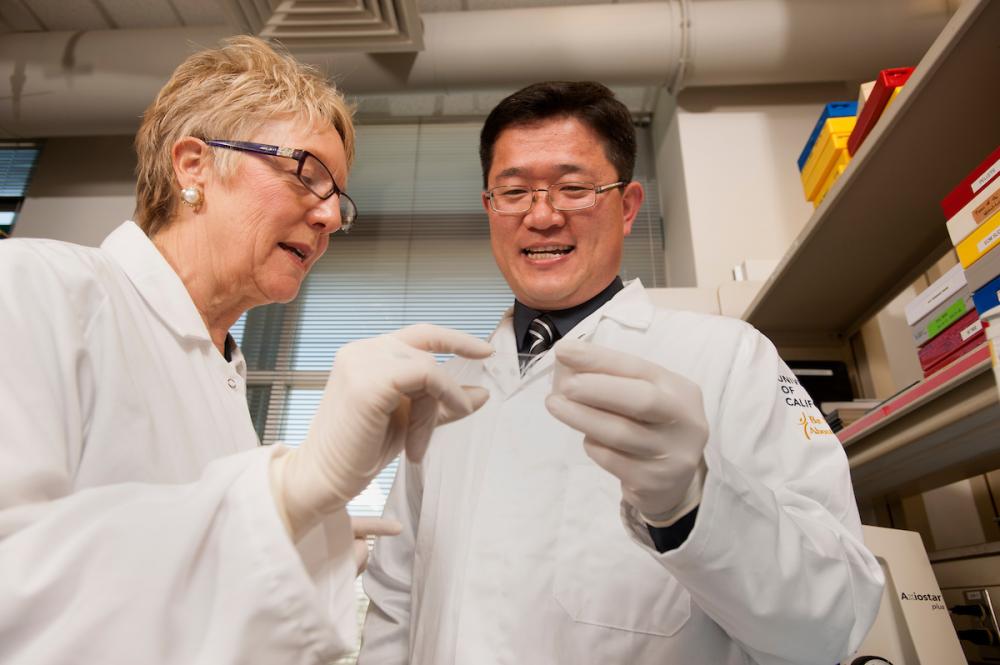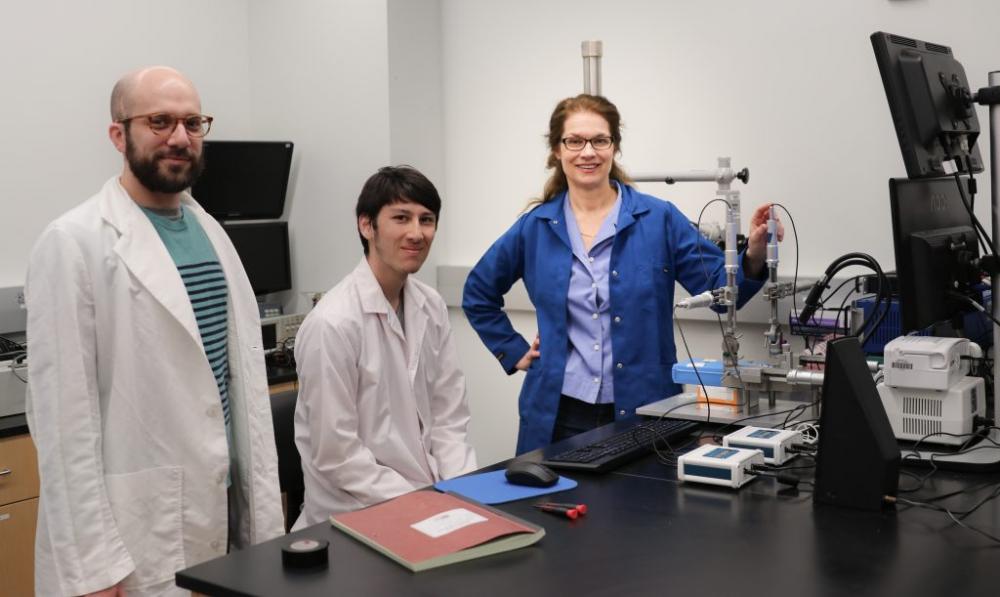
UC Davis Sets New Record High in Research Funding: $968 Million
The University of California, Davis, set a new record for external research funding, receiving $968 million in awards in the fiscal year 2020-21, up $27 million from the previous record set last year.
PICTURED ABOVE
From left: Puja Upadhayay takes notes while working with Whitney Brim-DeForest, identifying rice field weeds. Graduate student Victoria Dearborn takes temperature readings as part of research focusing on the relationship between changing urban vegetative landscapes and localized heat. Kyle Jacobs and Julia Loegering process COVID-19-positive blood samples, banking them for future research. Computer science professor Ian Davidson is studying how GPU (graphics processing unit) clusters can show bias. (Karin Higgins and Gregory Urquiaga/UC Davis)
The awards enable a broad range of research on topics including advancing human and animal health, protecting our planet and food supply, and enabling a more resilient society.
“This achievement reflects the unwavering commitment of our research community and their passion to address important societal needs — during a year when operations were constrained due to the COVID-19 pandemic,” Chancellor Gary S. May said. “The societal impact of UC Davis research is far-reaching, spanning geographical boundaries and catering to diverse populations and needs.”
A primary contributor to this year’s growth came from increased funding related to public health and medicine. The School of Medicine recognized the largest increase in funding, up $92 million from the previous year, totaling $368 million. Funding related to COVID-19 research totaled $42 million for the year. Research in this area is providing insight into testing, vaccines, treatments and social impacts.
The College of Agricultural and Environmental Sciences ($153 million), School of Veterinary Medicine ($83 million), College of Engineering ($80 million) and College of Biological Sciences ($58 million) rounded out the top five recipients.
The largest new award, $51 million from the Department of Health and Human Services’ Centers for Disease Control and Prevention, went to Marc Schenker, distinguished professor of public health sciences, to improve public health outcomes for all Californians by providing proper disease surveillance and prevention.
The federal government remained the largest provider of funding at $514 million, up $37 million from last year. The second leading source was the state of California at $164 million, up $32 million. Funding from industry made up the third highest source, totaling $116 million, up $31 million.
UC Davis researchers received a total of $11.5 million for 18 National Science Foundation CAREER Awards, a record for the university. These prestigious grants are offered to early-career researchers who have the potential to serve as academic role models in research and education and to lead their institutions and their disciplines in advancing knowledge for the benefit of society.
Interdisciplinary and multidisciplinary research

Collaborative research bringing experts together from different fields of study continues to attract significant funding. These joint efforts often focus on addressing complex, large-scale challenges that require expertise from many perspectives.
“We continue to see how multidisciplinary research provides a distinct advantage in tackling multifaceted issues,” said Prasant Mohapatra, vice chancellor for Research at UC Davis. “As one of the most academically comprehensive universities in the world, UC Davis offers a unique environment to solve these complex issues by bringing together experts from across our campuses.”
Notable multidisciplinary awards include:
- $20 million ($4.2 million allocated in FY 2020-21) from the U.S. Department of Agriculture’s National Institute of Food and Agriculture in partnership with the National Science Foundation to establish an institute focused on enabling the next-generation food systemsthrough the integration of artificial intelligence technologies. Principal investigators: Ilias Tagkopoulos, Xin Liu, Nitin Nitin and Jeffrey Earles.
- $16 million ($3.1 million allocated in FY 2020-21) from the National Institute of Mental Health for the UC Davis Conte Center to explore how infections in pregnancy lead to disorders in offspring. Principal investigators: Cameron Carter and Kimberly McAllister.
- $3 million from the California Department of Health Care Services to build and strengthen community-based health and social support systems in Yolo County that address adverse childhood experiences and toxic stress. Principal investigator: Leigh Ann Simmons, co-director of the Perinatal Origins of Disparities Center.
The Interdisciplinary Research and Strategic Initiatives division within the Office of Research offers support and resources to help teams advance their programs.

Other notable awards
For colleges, schools and Continuing and Professional Education:
- College of Agricultural and Environmental Sciences — Matt Hengel, adjunct professor in the Department of Environmental Toxicology, is the principal investigator for the IR-4 Minor Crop Pest Management project, which received a $16 million grant ($3.2 million allocated in FY 2020-21) from the USDA National Institute for Food and Agriculture. The goal of the project is to increase pest management options for specialty crops, including fruits, vegetables, nuts and ornamentals. Researchers conduct field and lab residue tests to assist with federal regulatory clearances for pest-control techniques.
- College of Biological Sciences — Venkatesan Sundaresan, professor and principal investigator, received $740,000 from the National Institute of Food and Agriculture for a project that will focus on specific functions that shape root microbiomes and their impacts on plant performance at the genomic and molecular levels, with the ultimate goal of deploying beneficial microbiota to improve plant growth and yields.
- College of Engineering — Karen Moxon, professor in the Department of Biomedical Engineering, received a $22 million grant ($10.9 million allocated in FY 2020-21) from the Department of Defense to develop interventions for spinal cord injuries that can be applied within days of injury to improve long-term outcomes. Moxon will lead a consortium of universities, biomedical startups and nonprofit organizations focused on bridging the gap with biological and electronic systems.

- Continuing and Professional Education — James Brown, chair of Professional Studies at UC Davis Continuing and Professional Education, received a $7.6 million grant from the State Water Resources Control Board. The grant builds on a 20-year relationship to provide training, such as, but not limited to, open enrollment courses, individual and small group instruction and development of new courses and customized training to meet evolving needs.
- College of Letters and Science — John Conway, professor of physics and faculty director of the UC Davis High Performance Computing Core Facility, received $7.4 million ($4.8 million allocated in FY 2020-21) from the U.S. Department of Energy to support experimental and theoretical research in areas including the Higgs boson, neutrinos, dark matter and quantum physics.
- Graduate School of Management — Damon Tull, director for industry alliances at the UC Davis Graduate School of Management and the Mike and Renée Child Institute for Innovation and Entrepreneurship, received $100,000 from the National Science Foundation to host an innovation summit for accelerating research and creating undergraduate courses in artificial intelligence and quantum information sciences at Hispanic Serving Institutions.
- School of Education — Michal Kurlaender, professor and department chair in the School of Education, received $142,000 from the Tipping Point Community to strengthen college preparation through diverse course pathways, addressing racial and economic inequalities.
- School of Law — Gabriel Chin, professor of law and director of Clinical Legal Education, received two grants from the State Bar of California totaling $203,000 to provide legal services without charge to indigent persons, particularly client groups that have traditionally lacked significant legal representation.
- School of Nursing — Sheryl Catz, professor at the UC Davis Betty Irene Moore School of Nursing, received $225,000 from the NIH National Cancer Institute for a project to improve the reach and effectiveness of smoking cessation services targeted to veterans living with HIV.
- School of Medicine — Diana Farmer, professor and chair in the Department of Surgery at UC Davis Health, received $9 million from the California Institute for Regenerative Medicine, or CIRM. Farmer is the principal investigator of the clinical trial, known formally as “The CuRe Trial” — a cellular therapy for in utero repair of myelomeningocele, which uses stem cells before birth to treat the most serious form of spina bifida.
- School of Veterinary Medicine — Koen Van Rompay, full research virologist at the California National Primate Research Center, received together with his collaborators, Sallie Permar (Weill Cornell Medical Center, New York) and Kristina De Paris (University of North Carolina, Chapel Hill), a $1.7 million grant from the National Institute of Allergy and Infectious Diseases, or NIAID, for a study titled “Early life vaccination to prevent HIV acquisition during adolescence.” These investigators also received a supplement on this grant that allowed them to perform a study testing COVID-19 vaccines in infant macaques.
Note: Where funds are awarded up-front to cover several years, the money is counted in the first year the award was received. Incrementally funded awards are counted as authorized in each year. Reports are based on the principal investigator’s home school or college.
Media Resources
Media Contacts:
- AJ Cheline, Office of Research, acheline@ucdavis.edu
- Andy Fell, News and Media Relations, 530-304-8888, ahfell@ucdavis.edu